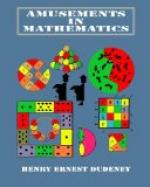367.—WINE AND WATER.
Mr. Goodfellow has adopted a capital idea of late. When he gives a little dinner party and the time arrives to smoke, after the departure of the ladies, he sometimes finds that the conversation is apt to become too political, too personal, too slow, or too scandalous. Then he always manages to introduce to the company some new poser that he has secreted up his sleeve for the occasion. This invariably results in no end of interesting discussion and debate, and puts everybody in a good humour.
Here is a little puzzle that he propounded the other night, and it is extraordinary how the company differed in their answers. He filled a wine-glass half full of wine, and another glass twice the size one-third full of wine. Then he filled up each glass with water and emptied the contents of both into a tumbler. “Now,” he said, “what part of the mixture is wine and what part water?” Can you give the correct answer?
368.—THE KEG OF WINE.
Here is a curious little problem. A man had a ten-gallon keg full of wine and a jug. One day he drew off a jugful of wine and filled up the keg with water. Later on, when the wine and water had got thoroughly mixed, he drew off another jugful and again filled up the keg with water. It was then found that the keg contained equal proportions of wine and water. Can you find from these facts the capacity of the jug?
369.—MIXING THE TEA.
“Mrs. Spooner called this morning,” said the honest grocer to his assistant. “She wants twenty pounds of tea at 2s. 41/2d. per lb. Of course we have a good 2s. 6d. tea, a slightly inferior at 2s. 3d., and a cheap Indian at 1s. 9d., but she is very particular always about her prices.”
“What do you propose to do?” asked the innocent assistant.
“Do?” exclaimed the grocer. “Why, just mix up the three teas in different proportions so that the twenty pounds will work out fairly at the lady’s price. Only don’t put in more of the best tea than you can help, as we make less profit on that, and of course you will use only our complete pound packets. Don’t do any weighing.”
How was the poor fellow to mix the three teas? Could you have shown him how to do it?
370.—A PACKING PUZZLE.
As we all know by experience, considerable ingenuity is often required in packing articles into a box if space is not to be unduly wasted. A man once told me that he had a large number of iron balls, all exactly two inches in diameter, and he wished to pack as many of these as possible into a rectangular box 24+9/10 inches long, 22+4/5 inches wide, and 14 inches deep. Now, what is the greatest number of the balls that he could pack into that box?
371.—GOLD PACKING IN RUSSIA.




